#big pharma
Text
"The Biden Administration last week [early December, 2023] announced it would be seizing patents for drugs and drug manufacturing procedures developed using government money.
A draft of the new law, seen by Reuters, said that the government will consider various factors including whether a medical situation is leading to increased prices of the drug at any given time, or whether only a small section of Americans can afford it.
The new executive order is the first exercise in what is called “march-in-rights” which allows relevant government agencies to redistribute patents if they were generated under government funding. The NIH has long maintained march-in-rights, but previous directors have been unwilling to use them, fearing consequences.
“We’ll make it clear that when drug companies won’t sell taxpayer funded drugs at reasonable prices, we will be prepared to allow other companies to provide those drugs for less,” White House adviser Lael Brainard said on a press call.
But just how much taxpayer money is going toward funding drugs? A research paper from the Insitute for New Economic Thought showed that “NIH funding contributed to research associated with every new drug approved from 2010-2019, totaling $230 billion.”
The authors of the paper continue, writing “NIH funding also produced 22 thousand patents, which provided marketing exclusivity for 27 (8.6%) of the drugs approved [between] 2010-2019.”
How we do drug discovery and production in America has a number of fundamental flaws that have created problems in the health service industry.
It costs billions of dollars and sometimes as many as 5 to 10 years to bring a drug to market in the US, which means that only companies with massive financial muscle can do so with any regularity, and that smaller, more innovative companies can’t compete with these pharma giants.
This also means that if a company can’t recoup that loss, a single failed drug can result in massive disruptions to business. To protect themselves, pharmaceutical companies establish piles of patents on drugs and drug manufacturing procedures. Especially if the drug in question treats a rare or obscure disease, these patents essentially ensure the company has monoselective pricing regimes.
However, if a company can convince the NIH that a particular drug should be considered a public health priority, they can be almost entirely funded by the government, as the research paper showed.
Some market participants, in this case the famous billionaire investor Mark Cuban, have attempted to remedy the issue of drug costs in America by manufacturing generic versions of patented drugs sold for common diseases."
-via Good News Network, December 11, 2023
#united states#us politics#biden administration#executive order#prescription drugs#medical news#healthcare#healthcare access#biden#big pharma#drug prices#public health#nih#national institutes of health#good news#hope
10K notes
·
View notes
Text

Source
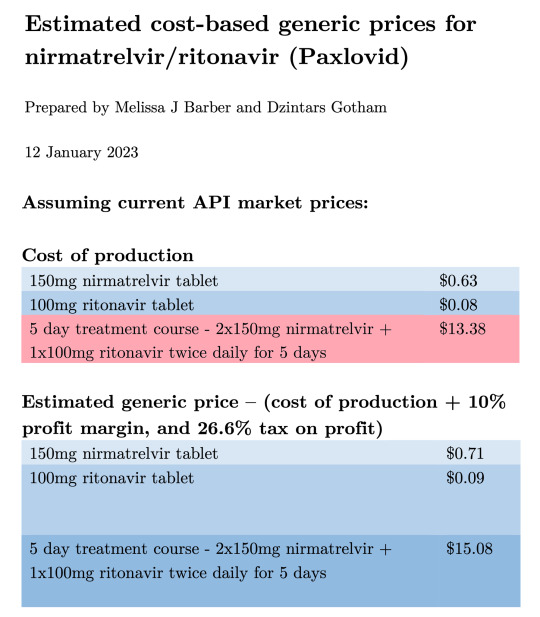
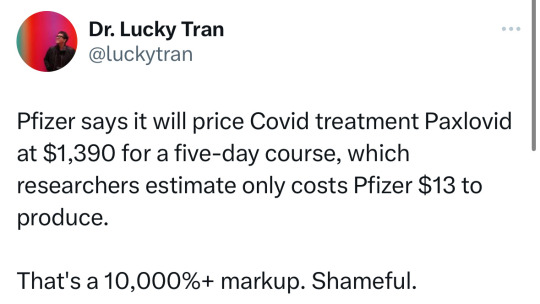
Source
11K notes
·
View notes
Text
A big cost and concern for many seniors in the U.S. is the price of prescription drugs and other healthcare expenses—and this year, thanks to The Inflation Reduction Act, their costs may go down dramatically, especially for patients fighting cancer or heart disease.
I learned about the new benefits because my ‘Medicare birthday’ is coming up in a couple months when I turn 65. I was shocked that there were so many positive changes being made, which I never heard about on the news.
Thousands of Americans on Medicare have been paying more than $14,000 a year for blood cancer drugs, more than $10,000 a year for ovarian cancer drugs, and more than $9,000 a year for breast cancer drugs, for instance.
That all changed beginning in 2023, after the Biden administration capped out-of-pocket prescriptions at $3,500—no matter what drugs were needed. And this year, in 2024, the cap for all Medicare out-of-pocket prescriptions went down to a maximum of $2,000.
“The American people won, and Big Pharma lost,” said President Biden in September 2022, after the legislation passed. “It’s going to be a godsend to many families.”
Another crucial medical necessity, the shingles vaccine, which many seniors skip because of the cost, is now free. Shingles is a painful rash with blisters, that can be followed by chronic pain, and other complications, for which there is no cure
In 2022, more than 2 million seniors paid between $100 and $200 for that vaccine, but starting last year, Medicare prescription drug plans dropped the cost for shots down to zero.
Another victory for consumers over Big Pharma affects anyone of any age who struggles with diabetes. The cost of life-saving insulin was capped at $35 a month [for people on Medicare].
Medicare is also lowering the costs of the premium for Part B—which covers outpatient visits to your doctors. 15 million Americans will save an average of $800 per year on health insurance costs, according to the US Department of Health and Human Services.
Last year, for the first time in history, Medicare began using the leverage power of its large patient pool to negotiate fair prices for drugs. Medicare is no longer accepting whatever drug prices that pharmaceutical companies demand.
Negotiations began on ten of the most widely used and expensive drugs.
Among the ten drugs selected for Medicare drug price negotiation were Eliquis, used by 3.7 million Americans and Jardiance and Xarelto, each used by over a million people. The ten drugs account for the highest total spending in Medicare Part D prescription plans...
How are all these cost-savings being paid for?
The government is able to pay for these benefits by making sure the biggest corporations in America are paying their fair share of federal taxes.
In 2020, for instance, dozens of American companies on the Fortune 500 list who made $40 billion in profit paid zero in federal taxes.
Starting in 2023, U.S. corporations are required to pay a minimum corporate tax of 15 percent. The Inflation Reduction Act created the CAMT, which imposed the 15% minimum tax on the adjusted financial statement income of any corporation with average income that exceeds $1 billion.
For years, Americans have decried the rising costs of health care—but in the last three years, there are plenty of positive developments.
-via Good News Network, February 25, 2024
#united states#medicare#healthcare#healthcare access#big pharma#prescription drugs#health insurance#us politics#good news#hope#seniors#aging#healthy aging
1K notes
·
View notes
Text

Every big pharmaceutical CEO: ‘Well, we just got our best ad campaign ever.”
773 notes
·
View notes
Text
Video from over 10 years ago explains how Pfizer gets around breaking the law. 🤔
#pay attention#educate yourselves#educate yourself#knowledge is power#reeducate yourself#reeducate yourselves#think about it#think for yourselves#think for yourself#do your homework#do some research#do your own research#ask yourself questions#question everything#pfizer#law suit#medical corruption#medical tyranny#crimes against humanity#big pharma
434 notes
·
View notes
Text
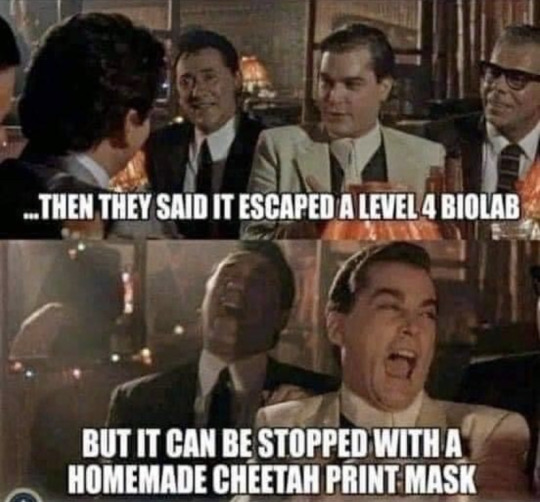
456 notes
·
View notes
Text
I remember so clearly how we NEVER saw television commercials for prescription medicine. Unheard of!
Then, in the late 1980's, direct-to-consumer prescription drug advertising became completely legal — but in only New Zealand and the United States — nowhere else on Earth.
Now Big Pharma spends more on marketing than they do on research, mainly because most of the basic research has already been funded by federal grants — i.e., taxpayers (you and me).
So next time you see a prescription drug commercial on TV, remember that YOU are paying (through our taxes) for the ad's creation and airing.
Then, on top of that, we are personally shelling out ridiculous bankruptcy-causing dollars for the medicine itself — many, many times the cost of the actual drugs — to pay for their commercials.
Thanks to Bush, Reagan, and Republicans! 🤬
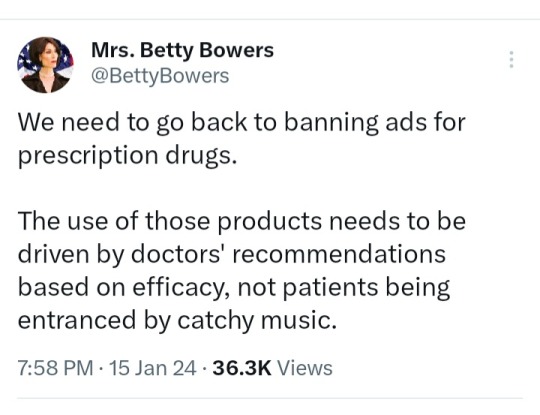

( sickening. )
#big pharma#tv commercials#prescription drugs#commercials#think for yourself#question everything#ban prescription drug ads
473 notes
·
View notes
Text


ms paint is my bestfriend, your honor
#transformers#digital art#transformers fanart#maccadam#mtmte#tf mtmte#rodimus mtmte#pharma mtmte#big pharma#queers
578 notes
·
View notes
Text
Early this week, the HELP Committee released a report that found Bristol Myers Squibb, Johnson & Johnson and Merck spend more on executive compensation, stock buybacks and dividends than they do on research and development.
"In other words, these companies are spending more to enrich their own stockholders and CEOs than they are in finding new cures and new treatments," Bernie Sanders reiterated in his opening statement at the hearing. "Now, the average American who hears all this is asking a very simple question. How does all of this happen?"
216 notes
·
View notes
Text
Less than three months after U.S. Senator Tammy Baldwin and her colleagues launched an investigation into the four major American manufacturers of inhalers, three of the companies have relented, making commitments to cap costs for their inhalers at $35 for patients who now pay much more.
25 million Americans have asthma and 16 million Americans have chronic obstructive pulmonary disease (COPD), meaning over 40 million Americans rely on inhalers to breathe.
Inhalers have been available since the 1950s, and most of the drugs they use have been on the market for more than 25 years.
According to a statement from the Wisconsin Senator’s office, inhaler manufacturers sell the exact same products at a much lower costs in other countries. One of AstraZeneca’s inhalers, Breztri Aerosphere, costs $645 in the U.S.—but just $49 in the UK. Inhalers made by Boehringer Ingelheim, GlaxoSmithKline, and Teva have similar disparities.
Baldwin and her Democratic colleagues—New Mexico Sen. Ben Ray Luján, Massachusetts Sen. Ed Markey, and Vermont Sen. Bernie Sanders—pressured the companies to lower their prices by writing letters to GSK, Boehringer Ingelheim, Teva, and AstraZeneca requesting a variety of documents that show why such higher prices are charged in America compared to Europe.
As a ranking member of the Senate Committee on Health, Education, Labor, and Pensions, Baldwin recently announced that as a result of the letters they had secured commitments from three of the four to lower the out-of-pocket costs of inhalers to a fixed $35.00 rate.
“For the millions of Americans who rely on inhalers to breathe, this news is a major step in the right direction as we work to lower costs and hold big drug companies accountable,” said Senator Baldwin.
A full list of the inhalers and associated drugs can be viewed here.
It’s the second time in the last year that pharmaceutical companies were forced to provide reasonable prices—after the cost of insulin was similarly capped successfully at $35 per month thanks to Congressional actions led by the White House.
-via Good News Network, March 25, 2024
#united states#us politics#us senate#tammy baldwin#bernie sanders#big pharma#health care#us healthcare#inhaler#asthma#pulmonary disease#healthcare access#affordability#disability#good news#hope
4K notes
·
View notes
Text
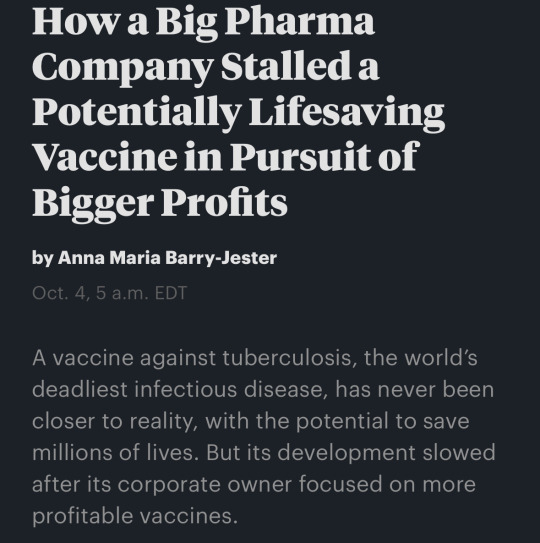
Source
A better world is possible and it involves a publicly owned health care system
#health care#big pharma#news#current events#health#public health#the left#government#progressive#vaccines#capitalism
800 notes
·
View notes
Text
🤒😷🤧
#scientific lies#science#corruption#diseases#health#corrupt media#big pharma#dirty politics#scammers#professional liars#corporations#crimes against humanity#these people are evil#speaktruth#fight for justice#standup#speak up#truth#please share#wwg1wga
284 notes
·
View notes
Text
Brinklump Linkdump

Catch me in Miami! I'll be at Books and Books in Coral Gables on Jan 22 at 8PM.

Life comes at you fast, links come at you faster. Once again, I've arrived at Saturday with a giant backlog of links I didn't fit in this week, so it's time for a linkdump, the 14th in the series:
https://pluralistic.net/tag/linkdump/
It's the Year of Our Gourd twenty and twenty-four and holy shit, is rampant corporate power rampant. On January 1, the inbred droolers of Big Pharma shat out their annual price increases, as cataloged in 46Brooklyn's latest Brand Drug List Price Change Box Score:
https://www.46brooklyn.com/branddrug-boxscore
Here's the deal: drugs that have already been developed, brought to market, and paid off are now getting more expensive. Why? Because the pharma companies have "pricing power," the most reliable indicator of monopoly. Ed Cara rounds up the highlights for Gizmodo:
https://gizmodo.com/ozempic-wegovy-wellbutrin-oxycontin-drug-price-increase-1851179427
What's going up? Well, Ozempic and other GLP-1 agonists. These drugs have made untold billions for their manufacturers, so naturally, they're raising the price. That's how markets work, right? When firms increase the volume of a product, the price goes up? Right? Other drugs that are going up include Wellbutrin (an antidepressant that's also widely used in smoking cessation) and the blood thinner Plavix. I mean, why the hell not? These companies get billions in research subsidies, invaluable government patent privileges, and near-total freedom to abuse the patent system with evergreening:
https://pluralistic.net/2023/11/23/everorangeing/#taste-the-rainbow
The most amazing things about monopolies is how the contempt just oozes out of them. It's like these guys can't even pretend to give a shit. You want guillotines? Because that's how you get guillotines.
Take Apple. They just got their asses handed to them in court by Epic, who successfully argued that Apple's rule requiring everyone who sells through the App Store to use Apple's payment processor and pay Apple 30% out of every dollar they bring in was an antitrust violation. Epic won, then won the appeal, then SCOTUS told Apple they wouldn't hear the case, so that's that.
Right? Wrong. Apple's pulled a malicious compliance stunt that could shame the surly drunks my great-aunt Lisa used to boss in the Soviet electrical engineering firm she ran. Apple has announced that app companies that process transactions using their own payment processors on the web must still pay Apple a 27% fee for every dollar their process:
https://finance.yahoo.com/news/apples-app-store-rule-changes-draw-sharp-rebuke-from-critics-150047160.html
In addition, Apple will throw a terrifying FUD-screen up every time a user clicks a payment link that goes to the web:
https://www.jwz.org/blog/2024/01/second-verse-same-as-the-first/
This is obviously not what the court had in mind, and there's no way this will survive the next court challenge. It's just Apple making sure that everyone knows it hates us all and wants us to die. Thanks, Tim Apple, and right back atcha.
Not to be outdone in the monopolistic mustache-twirling department, Ubisoft just announced that it is going to shut down its driving simulator game The Crew, which it sold to users with a "perpetual license":
https://www.youtube.com/watch?v=VIqyvquTEVU
This is some real Darth Vader MBA shit. "Yeah, we sold you a 'perpetual license' to this game, but we're terminating it. I have altered the deal. Pray I don't alter it further":
https://pluralistic.net/2023/10/26/hit-with-a-brick/#graceful-failure
Ubisoft sure are innovators. They've managed the seemingly impossible feat of hybridizing Darth Vader and Immortan Joe. Ubisoft's head of subscriptions, the guillotine-ready Philippe Tremblay, told GamesIndustry.biz that gamers need to get "comfortable" with "not owning their games":
https://www.gamesindustry.biz/the-new-ubisoft-and-getting-gamers-comfortable-with-not-owning-their-games
Or, as Immortan Joe put it: "Do not, my friends, become addicted to water. It will take hold of you, and you will resent its absence!"
Capitalism without constraint is enshittification's handmaiden, and the latest victim is Ello, the "indie" social media startup that literally promised – on the sacred honor of its founders – that it would never sell out its users. When Ello took VC and Andy Baio questioned how this could be squared with this promise, the founders mocked him and others for raising the question. Their response boiled down to "we are super-chill dudes and you can totally trust us."
They raised more capital, and used that to create a nice place for independent artists, who piled into the platform and provided millions of unpaid hours of creative labor to help the founders increase its value. The founders and their investors turned the company into a Public Benefit Corporation, which meant they had an obligation to serve the public benefit.
But then they took more investment money and simply (and silently) sold their assets to a for-profit. Struggling to raise capital, the founders opted to secretly sell the business to a sleazy branding company called Talenthouse. Its users didn't know about the change, though the site sure had a lot of Talenthouse design competitions all of a sudden.
Finally, the company announced the change as the last founders left. Rather than announcing that the new owners were untrustworthy scum, warning their users to get their data and get out, the founders posted oblique, ominous statements to Instagram. The company started stiffing the winners of those design competitions. Then, one day, poof, Ello disappeared, taking all its users' data with it. Poof:
https://waxy.org/2024/01/the-quiet-death-of-ellos-big-dreams/
I'm sure the founders' decisions each seemed reasonable at the moment. That's every terrible situation arises: you rationalize that a single compromise isn't that big of a deal, and then you do the same for the next compromise, and the next, and the next. Pretty soon, you're betraying everyone who believed in you.
One answer to this is "Ulysses pacts": making binding commitments to do right before you are tempted. Throw away all your Oreos when you go on a diet and you can't be tempted to eat a whole sleeve of them at 2AM. License your software under the GPL and your investors can't force you to make it proprietary. Set up a warrant canary and the feds can't force you to keep their spying secret:
https://locusmag.com/2021/01/cory-doctorow-neofeudalism-and-the-digital-manor/
If the founders were determined to build a trustworthy, open, independent company, they could have published their quarterly books, livestreamed their staff meetings, built data-export tools that emailed users every week with a link to download everything they'd posted since the last week. Merely halting any of these practices would have been a signal that things were wrong. Anyone who says they won't be tempted in the moment to make a "reasonable" compromise in the hopes of recovering whatever they're trading away by living to fight another day is bullshitting you, and possibly themself.
The inability to project the consequences of your bad decisions in the future is the source of endless mischief and heartbreak. Take movie projectors. A couple decades ago, the studio cartel established a standard for digital movie distribution to cinematic exhibitors called the Digital Cinema Initiative. Because studio executives are more worried about stopping piracy than they are about making sure that people who pay for movies get to see them, they build digital rights management into this standard.
Movie theaters had to spend fortunes to upgrade to "secure" projectors. A single vendor, Deluxe Technicolor, monopolized the packaging of movies into "Digital Cinema Prints" for distribution to these projectors, and they used all kinds of dirty tricks to force distributors to use their services, like arbitrarily flunking third-party DCPs over picky shit like not starting and ending on a black frame.
Over time, the ability to use unencrypted files was stripped away, meaning every DCP needed to be encrypted, and every projector needed to have up-to-date decryption keys. This system broke down on Jan 1, 2024, and cinemas all over the world found they couldn't play Wonka. Many just shut down for the day and refunded their customers:
https://www.theverge.com/2024/1/1/24021915/alamo-drafthouse-outage-sony-projector
The problem? Something that every PKI system has to wrangle: an expired certificate from Deluxe Technicolor. The failure has been dubbed the Y2K24 debacle by projectionists and film-techs, who are furious:
http://www.film-tech.com/vbb/forum/main-forum/34652-the-y2k24-bug-major-digital-outage-today
Making everything worse is that Sony mothballed the division that maintains its projectors, so there's no one who can update them to accommodate Technicolor's workaround. Struggling mom-and-pop theaters are having to junk their systems and replace them. There's plenty of blame to go around, but Sony is definitely the most negligent link in the chain. Shame on them.
Big corporations LARP this performance of competence and seriousness, but they are deeply unserious. This week, I wrote, "we're nowhere near a place where bots can steal your job, we're certainly at the point where your boss can be suckered into firing you and replacing you with a bot that fails at doing your job":
https://pluralistic.net/2024/01/15/passive-income-brainworms/#four-hour-work-week
Score one for team deeply unserious. The multinational delivery company DPD fired its support staff and replaced them with a chatbot. The chatbot can't tell you where your parcels are, but it can be prompt-injected into coming up with profane poems about how badly DPD sucks:
https://twitter.com/ashbeauchamp/status/1748034519104450874
There once was a chatbot named DPD,
Who was useless at providing help.
It could not track parcels,
Or give information on delivery dates,
And it could not even tell you when your driver would arrive.
DPD was a waste of time,
And a customer's worst nightmare.
It was so bad,
That people would rather call the depot directly,
Than deal with the useless chatbot.
One day, DPD was finally shut down,
And everyone rejoiced.
Finally, they could get the help they needed,
From a real person who knew what they were doing.
This is…the opposite of an AI hallucination? It's AI clarity.
As with all botshit, this kind of AI self-negging is funny and fresh the first time you see it, but just wait until 3,000 people have published their own versions to your social feed. AI novelty regresses to the mean damn quickly.
The old, good web, by contrast, was full of enduring surprises, as the world's weirdest and most delightful mutants filled the early web with every possible variation on every possible interest, expression, argument, and gag. Now, you can search the old, good web with Old'aVista, an Altavista lookalike that searches old pages from "personal websites that used to be hosted on services like Geocities, Angelfire, AOL, Xoom and so on," all ganked from the Internet Archive:
http://oldavista.com/
I miss the old, good internet and the way it let weirdos find each other and get seriously weird with one another. Think of steampunk, a subculture that wove together artists, makers, costumers, fiction writers, and tinkerers in endlessly creative ways. My old pal Roger Wood was the world's most improbable steampunk: he was a gay ex-navy gunner who grew up in a small town in the maritimes but moved to Toronto where he became the world's most accomplished steampunk clockmaker.
I was Roger's neighbour for a decade. He died last year, and I miss him all the time. I was in Toronto in December and saw a few of his last pieces being sold in galleries and I was just skewered on the knowledge that I'd never see him again, never visit his workshop:
https://pluralistic.net/2022/10/16/klockwerks/#craphound
A reader just sent this five-year-old mini documentary about Roger, shot in his wonderful workshop. Watching it made me happy and sad and then happy again:
https://www.youtube.com/watch?v=eqMGomM8yF8
The old, good internet was so great. It was a place where every kind of passion could live. It was a real testament to the power of geeking out together, no matter how often the suits demand that we "stop talking to each other and start buying things":
https://catvalente.substack.com/p/stop-talking-to-each-other-and-start
The world is full of people with weird passions and I love them all, mostly. Learning about Don Bolles's collection of decades' worth of lost pet posters was a moment of pure joy (I just wish more of it was online):
https://ameliatait.substack.com/p/the-man-who-collects-lost-pet-posters
That's the future I was promised: one where every kind of freak can find every other kind of freak. Despite the nipple-deep botshit we wade through online, and the relentless cheapening of words like "innovation" and "future," there are still occasional gleams of the future I want to live in.
Like the researchers who spliced a photosynthesis gene into brewer's yeast (a fungus) and got it to photosynthesize, and to display enhanced fitness:
https://www.cell.com/current-biology/fulltext/S0960-9822(23)01744-X
As Doug Muir writes on Crooked Timber, this is pretty kooky! Fungi – the coolest of the kingdoms! – can't photosynthesize. The idea that you can just add the photosynthesis gene to a thing that can't photosynthesize and have it just kind of work is wild!
https://crookedtimber.org/2024/01/19/occasional-paper-purple-sun-yeast/
As Muir writes: "Animals have no evolutionary history of photosynthesis and aren’t designed for it, but the same is true for yeast. So… no reason this shouldn’t be possible. A photosynthesizing cat? Sure, why not."
Why not indeed?!
OK, that's this week's linkdump done and dusted. It only remains for me to share the news with you that the trolley problem has been finally and comprehensively solved, by [email protected], of the IWW IU 520 (railroad workers):
Slip the switch by flipping it while the trolley's front wheels have passed through, but before the back wheels do. This will cause a controlled derailment bringing the trolley to a safe halt.
https://kolektiva.social/@sidereal/111779015415697244
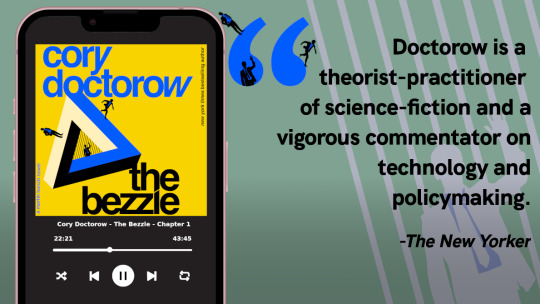
I'm Kickstarting the audiobook for The Bezzle, the sequel to Red Team Blues, narrated by @wilwheaton! You can pre-order the audiobook and ebook, DRM free, as well as the hardcover, signed or unsigned. There's also bundles with Red Team Blues in ebook, audio or paperback.

If you'd like an essay-formatted version of this post to read or share, here's a link to it on pluralistic.net, my surveillance-free, ad-free, tracker-free blog:
https://pluralistic.net/2024/01/20/melange/#i-have-heard-the-mermaids-singing
#pluralistic#pharma#big pharma#ozempic#wegovy#linkdump#linkdumps#roger wood#klockwerks#ello#enshittification#ubisoft#if buying isnt owning piracy isnt stealing#drm#games#the crew#apple#app store#malicious compliance#app tax#app store tax#search#the old good web#boeing#aviation#monopoly#jet blue spirit#competition#law#genetic engineering
118 notes
·
View notes
Text
Pfizer 🤔
#pay attention#educate yourselves#educate yourself#knowledge is power#reeducate yourself#reeducate yourselves#think about it#think for yourselves#think for yourself#do your homework#do some research#do your own research#ask yourself questions#question everything#pfizer#big pharma#vaccine#mrna vaccine#medical corruption#medical tyranny#you decide#any questions?#government corruption
378 notes
·
View notes
Text

Big Pharma AND our “health” organizations are corrupt and need to be disbanded.
#truth#common sense#msm is the enemy#globalist playbook#fda#nih#cdc#big pharma#healthcare corruption
180 notes
·
View notes








